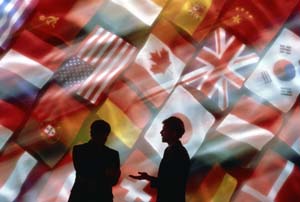In times of economic uncertainty, trade almost always becomes suspect in the minds of voters. Since World War II, presidents and a majority of Congress have supported the lowering of trade barriers and the principle of free trade. But,in this election cycle we are seeing no such support, says a business professor at Washington University in St. Louis. And that is a worrisome trend.
“I find this frightening because the bipartisan consensus that supported free trade since the end of World War II seems to have broken down in the current political environment,” says James Little, Ph.D., professor of business at the Olin School of Business. “My sense is that fear of China and India — and of globalization generally — is producing a political climate which threatens the very prosperity that trade and open capital markets have given us.”

There is ample proof that free trade matters a great deal — because it has made Americans better off. Little says that Gary Hufbauer, a scholar of international economics, estimates that since 1945, globalization has led to an overall gain to the U.S. economy of $1 trillion per year. This works out to an annual income of about $10,000 per household.
“Because this gain comes in the form of higher wages, lower prices and better product choices, it is largely invisible to most Americans,” says Little, who also points out that estimates show that further liberalization of trade could provide an additional $5,000 per household. That makes the $600 or $1,200 tax rebates that congress is proposing seem like small change.”
The political environment puts these gains at risk, especially because none of the political candidates has taken a strong stand or differentiated themselves from the others.
“I am frightened because these trade dividends are at risk. It has happened before: Between the end of the First World War and 1930, the world engaged in a vicious trade war. We all know how that ended up — economic depression, the rise of fascism and ultimately a terrible war,” says Little.
Little points out that some people lose from free trade, and that complementary policies which soften these losses and lead to a sharing of the benefits are required for on-going public support. He also notes that gains from economic growth in rich countries have gone disproportionately to the wealthy. Those who perceive themselves as falling behind, whether right or wrong, put globalization and trade at the top the list of causes.
Business can, and should, play a role in influencing trade policy in the U.S., Little says.
“First, business must recognize that shareholders have been the beneficiaries of globalization,” he says. “Returns to capital have been rising, and the share of profits in national income is higher than it has been for a long time. Skilled senior managers have been winners too — as a group they are among the significant gainers from globalization.
“Second, business must recognize that the continuation of these gains is not inevitable. Third, business must engage the political process — not to game the system so as to gain advantage in the short run, but rather to support creative solutions to the winners vs. losers problem.
“What this means is that business must suppress its inclinations to engage in narrow self-interested behavior and recognize that there is more at stake here.”
Even though Little thinks our political leaders have a responsibility to actually lead on this, none of the current candidates has thus far shown any inclination to do so — and he doubts any of them will.
Editor’s note: Professor Little is available for live or taped interviews using Washington University’s free VYVX or ISDN lines. Please contact Shula Neuman at (314) 935-5202 for assistance.